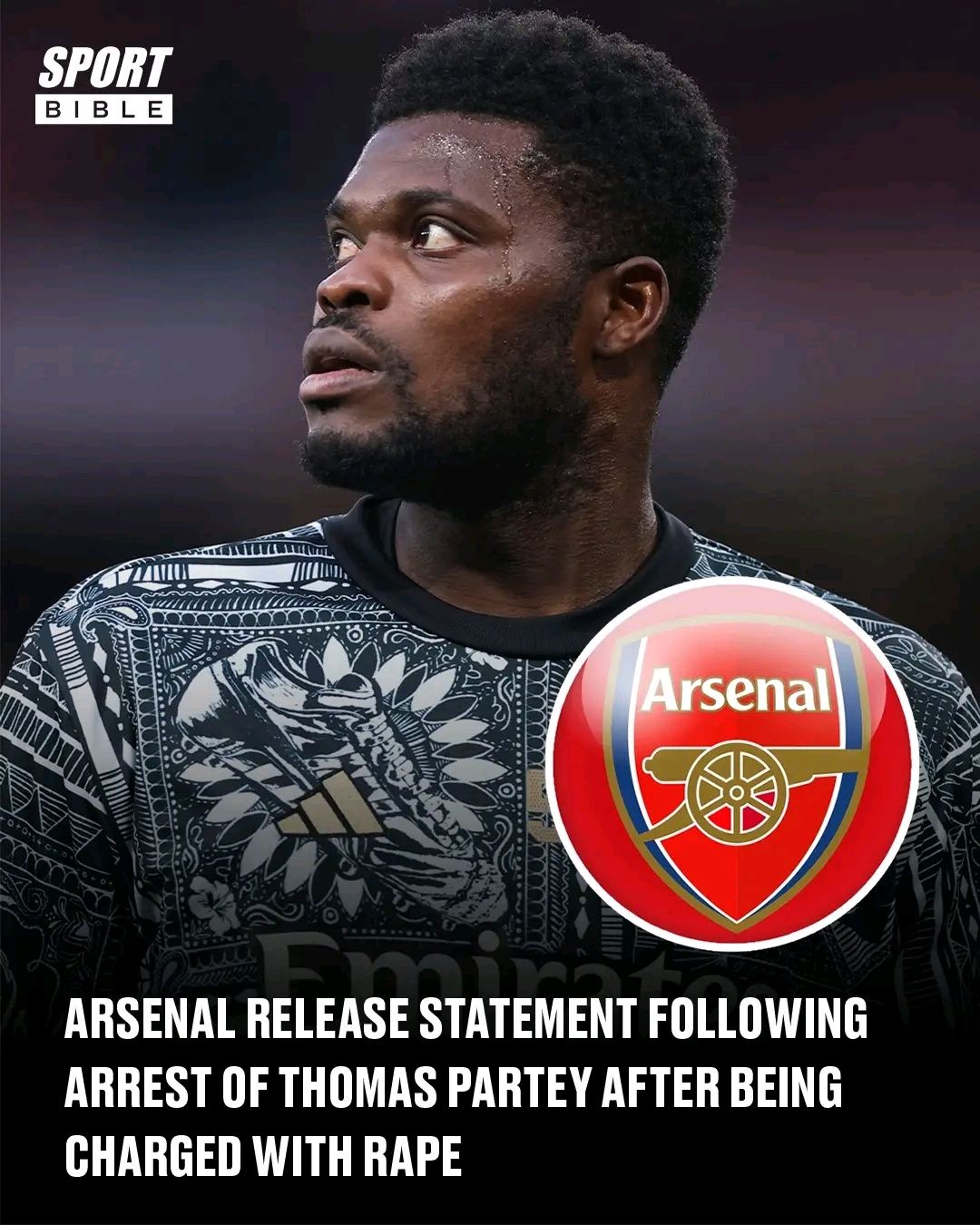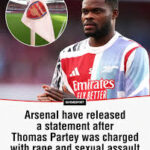The club have issued a statement.

The reaction among supporters was immediate and split down the middle. Some took to social media to say the club was right to distance itself, that any player accused of such crimes should not be given the shield of a football institution. Others insisted he was innocent until proven guilty, and that Arsenal were too quick to wash their hands of him. The debate became toxic quickly, with insults flying and old rivalries between supporters of different clubs being stoked by the scandal. Meanwhile, the legal language surrounding the case was careful and stern. The Crown Prosecution Service, speaking through Chief Crown Prosecutor Jaswant Narwal, said prosecutors had carefully reviewed a comprehensive file of evidence. They had worked closely with the Metropolitan Police, examining every detail, before deciding these were the appropriate charges to bring. Narwal reminded the public that criminal proceedings were now active. That meant the rules of a fair trial had to be protected. No speculation. No trial by social media. No salacious gossip that could prejudice the case. It was a warning that would be ignored in many corners of the internet, as hashtags and comments ran wild with speculation and condemnation and defiance. Partey himself, through his lawyer, issued a firm denial. He denied all the charges. He insisted he had cooperated fully with the police and prosecutors for three years. He said he welcomed the chance to finally clear his name. His legal team described a man who had lived under a cloud of suspicion for too long, desperate for the chance to fight back in court and prove the accusations false.
But outside the formal language of police statements and legal caution, there was no escaping the human drama. Partey was once a major investment for Arsenal, a signing that had electrified the fanbase in 2020. The club triggered his £45 million release clause at Atletico Madrid, signaling real ambition. Supporters celebrated his arrival as a turning point, the arrival of steel and skill in the midfield that had so often been Arsenal’s Achilles heel. His first months were challenging, interrupted by injuries, but there were flashes of the player Arsenal had paid for. Over time, he became a mainstay when fit, contributing nine goals across 167 appearances in all competitions. Managers trusted him to anchor midfield battles. Fans sang his name. Children wore shirts with his number on the back. It was supposed to be a partnership that returned Arsenal to the summit of English football. But even before these charges, the relationship had frayed. Partey’s contract was allowed to run down to June 30 without renewal, suggesting the club was ready to move on regardless of the investigation’s outcome.
Now, as the legal machinery moved relentlessly forward, that separation seemed inevitable and permanent. But for many supporters, it was impossible to discuss footballing reasons for his departure without acknowledging the allegations. Some asked pointed questions about whether Arsenal should have acted sooner, whether they should have suspended him pending investigation, whether they had prioritized sporting goals over moral responsibility. Others defended the club, saying no charges had existed for years, that police investigations alone weren’t enough to punish a man, and that only now, with formal charges filed, was it appropriate for the club to wash their hands. This debate was personal and painful for many, because it forced uncomfortable truths about how we treat allegations of sexual violence in sport.
Journalists and commentators picked over every word of the police statement. They recited the timeline: February 2022, the start of the investigation. Nearly three years of police work. Multiple alleged victims. Multiple allegations. They noted how rare it was for so many charges to arise at once. The legal experts explained that prosecutors don’t file such charges lightly, and that assembling a case with multiple accusers usually indicates significant evidence. But they also reminded everyone that the bar for conviction is high. The trial would not be simple. Witness testimony, cross-examination, forensic evidence—all would come under brutal scrutiny. Even as many on social media were convinced of his guilt, others were equally convinced of a conspiracy or false accusations. The court would have to sort fact from fiction.
And as the legal wheels turned, the human cost loomed large. There were alleged victims at the center of this, women who, if their accusations were true, had suffered unimaginable violence. For them, the process would be grueling, exposing every aspect of their lives to cross-examination and public speculation. Support groups and campaigners warned of the chilling effect such high-profile cases can have. Survivors of sexual violence sometimes see what happens to women who come forward in famous cases and decide to stay silent about their own abuse. They see the insults, the disbelief, the threats, the media attention, and they think it’s safer to say nothing.
The case also cast a long shadow over football itself. This was not the first time a high-profile player had been charged with sexual offences. The sport has a troubled history of brushing such allegations under the carpet, of valuing talent and revenue over ethics. Clubs often struggle with balancing loyalty to players with responsibility to victims. Sponsors watch nervously, sometimes pulling their money at the first hint of scandal. Governing bodies issue statements about taking such matters seriously but rarely move fast enough for critics. The Partey case forced football to confront those questions yet again.
Inside Arsenal, the mood was said to be one of grim silence. Current and former teammates declined to comment publicly, but off the record, some expressed shock. Others said they had long been aware of the investigation and had already made up their minds to keep their distance. For the club leadership, there were no easy answers. Legally, they couldn’t say much without risking a lawsuit or breaching contempt-of-court rules. Morally, they had to show they took the allegations seriously. Commercially, they had to reassure sponsors and fans that the club’s reputation was safe.
All of this played out as Partey himself prepared to appear at Westminster Magistrates’ Court on Tuesday, August 5. He would stand in the dock, hear the charges read out, and enter a plea. Legal analysts said that hearing would be brief but momentous. The world’s media would be there, cameras waiting for the shot of the footballer in a suit, head bowed, flanked by lawyers. His family, friends, and supporters would rally behind him, insisting on his innocence. The alleged victims would watch anxiously, dreading the spotlight, but hoping for justice.
As the news cycle churned, rival fans taunted Arsenal supporters. Memes circulated. Jokes were made. Some Arsenal fans lashed out in anger, insisting the club had no blame, while others turned on each other, accusing the club of moral cowardice or hypocrisy. Social media became a battlefield of opinion, with very little space for nuance. Even among journalists, some pushed the story’s more salacious angles for clicks, while others tried to focus on the legal process and victims’ rights.
The scale of the charges was hard to ignore. Five counts of rape, not one or two. That number alone forced people to pay attention. It triggered debates about how society handles allegations of serial sexual violence, about the credibility we assign to multiple accusers, about the danger of dismissing patterns as coincidences. Feminist activists seized the moment to highlight what they called football’s “rape culture,” accusing clubs of protecting stars at all costs. Others pushed back, warning against trial by media, reminding everyone of the principle of innocence until proven guilty.
Partey’s own statement, delivered through his lawyer, struck a defiant note. He denied all wrongdoing. He claimed he had cooperated for years without complaint. He wanted the chance to clear his name. It was the kind of denial many expected, but it also became a rallying cry for those who believed in his innocence. For them, the timing of the charges—after his contract expired—was suspicious. They speculated about motives, about conspiracies, about character assassination. They pointed to his career at Atletico Madrid, his success at Arsenal, his charitable work, as proof of good character. They accused the police of overreach and the media of bias.
The football authorities, for their part, were careful to say almost nothing. The Premier League offered the standard line about taking such matters seriously, monitoring developments, and respecting the legal process. The FA said nothing. FIFA stayed silent. Sponsors made discreet inquiries but said little publicly. Everyone waited to see what would happen in court.
And the court case promised to be ugly. Legal experts predicted a battle over evidence. Defense lawyers would demand to see all witness statements, forensic results, phone records, social media posts—anything that could undermine the accusers’ credibility. Prosecutors would present their case methodically, trying to show a pattern of behavior. Witnesses would be grilled. Private lives would be dissected. The press would report every detail they could legally print. The public would watch, argue, take sides.
For Arsenal, it was the worst kind of publicity. Even if Partey was no longer their player, his name would always be linked to them. They had invested £45 million in him. They had put him on billboards, in social media campaigns, in shirt sales. They had made him part of their brand. Now that brand was being dragged through the mud. Critics said this was the price of valuing talent over ethics. Defenders said it was unfair to blame a club for a player’s private crimes. But either way, the damage was done.
As the weeks passed, the club tried to move on. They had new players to sign, new matches to prepare for. But every press conference brought questions about Partey. Every fan discussion eventually circled back to him. The manager had to dodge questions. Teammates had to bite their tongues. It was a scandal that wouldn’t go away. For Partey himself, the legal battle would be all-consuming. His career was effectively on hold. No club would sign him while he faced these charges. Sponsors would avoid him. He would become, at least for now, football’s most infamous free agent.
But for many observers, the most important voices were those of the alleged victims. Their names were withheld, their faces hidden, but their accusations were now part of the public record. Campaigners called for compassion, for respect, for a process that didn’t retraumatize them. They reminded everyone that the statistics on sexual violence convictions were bleak. Most rapes went unreported. Most reported cases didn’t lead to charges. Even fewer led to convictions. For many, the mere fact that charges had been filed was a sign of how seriously the authorities took this case. But others insisted on caution. They warned against assuming guilt. They said careers had been destroyed by false accusations before. They demanded that the media refrain from smearing a man who hadn’t yet stood trial. They insisted that true justice required patience, evidence, and due process.
In the end, that was what the court would have to decide. The prosecutors would lay out their evidence. The defense would challenge it. A jury would weigh it all. A judge would ensure the rules were followed. And the world would watch, hungry for answers, for justice, for vindication, for scandal.
For Arsenal, the scandal would linger long after the final whistle of the trial. Even if Partey was acquitted, there would be questions about how they handled the investigation years earlier. If he was convicted, they would face accusations of having sheltered a predator in their dressing room. Either way, the stain would be hard to scrub out.
As the summer wore on, the club focused on new signings, new tactics, new dreams of trophies. But behind every press release and training video, there was an unspoken acknowledgment that the Partey case had changed things. Fans argued about it at the pub. Journalists asked about it at every opportunity. Rivals mocked them. And Thomas Partey himself? He waited. For his day in court. For the chance to speak. For the verdict that would define him forever. This was not just another football transfer story. Not just another scandal to be forgotten in a week. It was a test for football, for justice, for us all.















